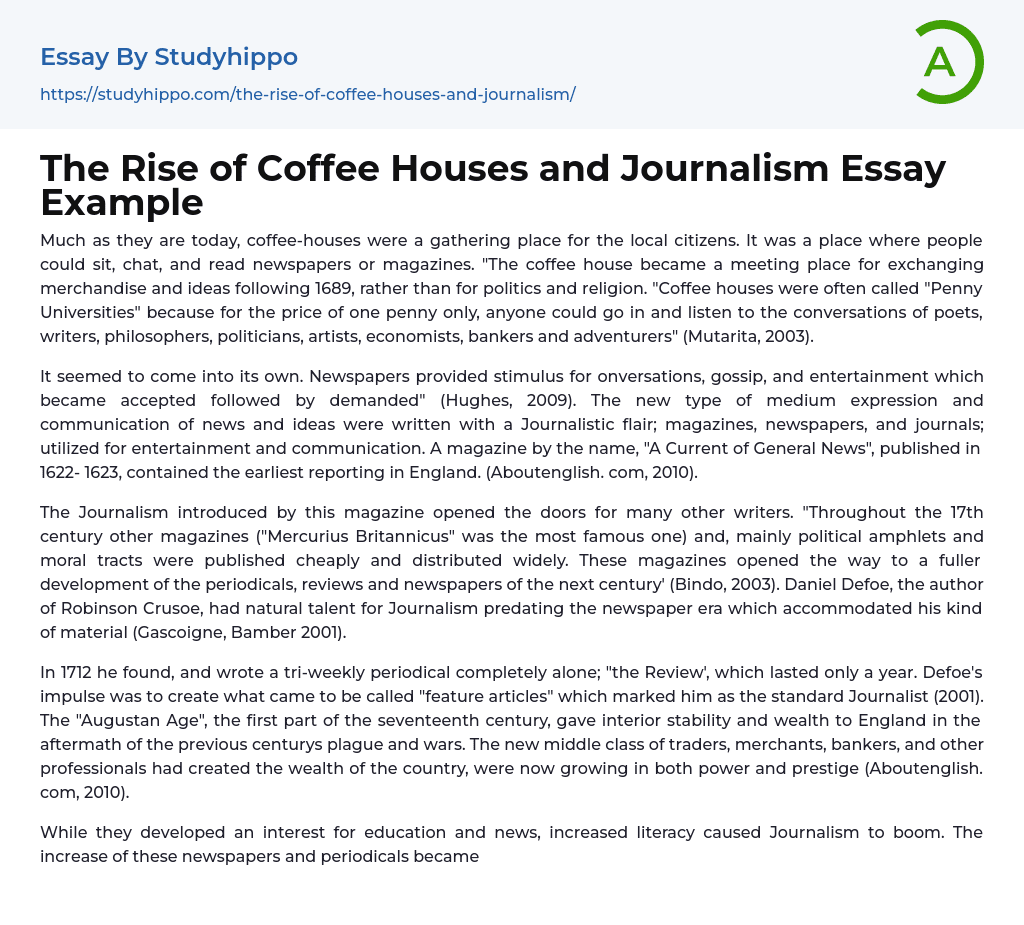Much as they are today, coffee-houses were a gathering place for the local citizens. It was a place where people could sit, chat, and read newspapers or magazines. "The coffee house became a meeting place for exchanging merchandise and ideas following 1689, rather than for politics and religion. "Coffee houses were often called "Penny Universities" because for the price of one penny only, anyone could go in and listen to the conversations of poets, writers, philosophers, politicians, artists, economists, bankers and adventurers" (Mutarita, 2003).
It seemed to come into its own. Newspapers provided stimulus for onversations, gossip, and entertainment which became accepted followed by demanded" (Hughes, 2009). The new type of medium expression and communication of news and ideas were written with a Journalistic flair; magazines, newspapers, and journals; utilized for entertainment and communication. A magazi
...ne by the name, "A Current of General News", published in 1622- 1623, contained the earliest reporting in England. (Aboutenglish. com, 2010).
The Journalism introduced by this magazine opened the doors for many other writers. "Throughout the 17th century other magazines ("Mercurius Britannicus" was the most famous one) and, mainly political amphlets and moral tracts were published cheaply and distributed widely. These magazines opened the way to a fuller development of the periodicals, reviews and newspapers of the next century' (Bindo, 2003). Daniel Defoe, the author of Robinson Crusoe, had natural talent for Journalism predating the newspaper era which accommodated his kind of material (Gascoigne, Bamber 2001).
In 1712 he found, and wrote a tri-weekly periodical completely alone; "the Review', which lasted only a year. Defoe's impulse was to create what came to be called "feature articles" which marke
him as the standard Journalist (2001). The "Augustan Age", the first part of the seventeenth century, gave interior stability and wealth to England in the aftermath of the previous centurys plague and wars. The new middle class of traders, merchants, bankers, and other professionals had created the wealth of the country, were now growing in both power and prestige (Aboutenglish. com, 2010).
While they developed an interest for education and news, increased literacy caused Journalism to boom. The increase of these newspapers and periodicals became all the rage with both with upper and middle classes (2010). The coffee houses and Journalism were a stepping tone that helped to influence the development of the English verbal communication. Newspapers continued to became increasingly popular through to the arrival of the 18th century. Due to its nature of delivering information, entertainment, and political headlines, it held the interest of many of the community.
- Cleaning essays
- Beef essays
- Beer essays
- Beverages essays
- Bread essays
- Burger essays
- Cake essays
- Coconut essays
- Coffee essays
- Cooking essays
- Crowd essays
- Cuisines essays
- Dairy essays
- Desserts essays
- Dinner essays
- Drink essays
- Fast Food essays
- Favorite Food essays
- Food Safety essays
- Food Security essays
- Food Waste essays
- Fruit essays
- Ginger essays
- Hamburger essays
- Ice Cream essays
- Juice essays
- Lemon essays
- Meal essays
- Meat essays
- Oreo essays
- Organic Food essays
- Pizza essays
- Rice essays
- Sainsbury essays
- Sugar essays
- Taste essays
- Tea essays
- Wine essays
- Adaptation essays
- Adventure essays
- Adversity essays
- Aging essays
- Alcohol essays
- Barbie Doll essays
- Beauty essays
- Care essays
- Carpe diem essays
- Change essays
- Chess essays
- Chicken essays




